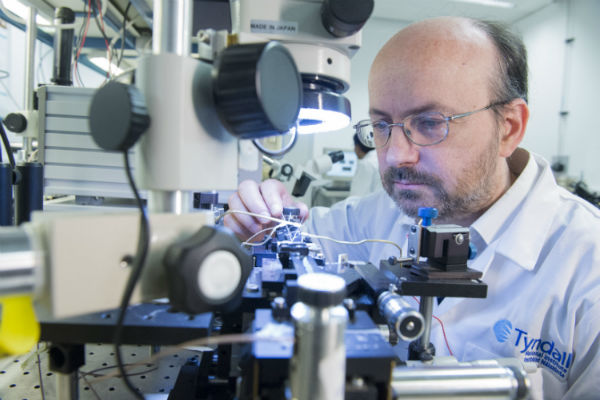
Tyndall Photonics Researchers Working with EU Partners to Develop Prototype
Researchers at Tyndall National Institute at UCC are taking part in a new European project to develop a low cost, easy to use 3D imaging system that will help enable faster and more accurate diagnosis of colorectal cancers. The Optical Coherence Tomography (OCT) system is being developed by Tyndall as part of the recently launched PICCOLO project, an EU Horizon 2020 funded initiative, bringing together scientists and clinicians across Europe to create an endoscope probe to better diagnose bowel polyps and early colon cancer.
Tyndall researcher, Dr. Brendan Roycroft explains: “Using breakthrough photonics, (the generation, manipulation and utilisation of light), we can create 3D images to diagnose non-cancerous polyps, pre-cancerous polyps and early colon cancers via an endoscope. The imaging is non-destructive, and we will be able to see below the surface of the tissue to identify internal polyp structure, providing valuable information as to the polyp type without a surgeon having to cut out a non-cancerous polyp and examine it in a lab. This will result in less discomfort for the patient, while also reducing the costs and time necessary for accurate diagnosis.”

Colorectal cancer represents around one tenth of all cancers worldwide. Through early, accurate diagnosis and precise intervention, cure rates can increase by up to 90%. Across the globe, colon cancer remains the second most common cancer in women, behind breast cancer, and the third most common in men, behind lung and prostate cancer.
Tyndall’s OCT research team includes researchers from Cork Institute of Technology and the Irish Photonic Integration Centre (IPIC) hosted at Tyndall. The advanced PICCOLO endoscope will use OCT, MPT (Multi-Photon Tomography) and fluorescence imaging to provide high-resolution information, giving details of the changes occurring at the cellular level. The PICCOLO project team aim to have refined their first prototype by the end of 2018 and target clinical trials to begin around 2020. It is hoped the new image based diagnosis method could eventually be applied to diseases in other organs of the body.
About PICCOLO
The multidisciplinary PICCOLO team proposes a new compact, hybrid and multimodal photonics endoscope based on Optical Coherence Tomography (OCT) and Multi-Photon Tomography (MPT) combined with novel red-flag fluorescence technology for in vivo diagnosis and clinical decision support. By combining the outstanding structural information from OCT with the precise functional information from MPT, this innovative endoscope will provide gastroenterologists immediate and detailed in situ identification of colorectal neoplastic lesions and facilitate accurate and reliable in vivo diagnostics, with additional, grading capabilities for colon cancer as well as in-situ lesion infiltration and margin assessment. With the development of compact instrumentation, the cost of the components and thus the system will be significantly reduced. Human representative animal models will be used to generate imaging biomarkers that allow automated detection, assessment and grading of disease. The developed system will be tested in human samples ex vivo in operating room conditions. The consortium comprises the whole value chain including pre-clinical and clinical partners, technology providers, photonics SMEs and endoscopy market leader company. The project will permit these companies to enhance their competitiveness and leadership in the diagnostics sector as well as exploiting new market opportunities. The new endoscope will significantly impact clinical practice allowing in vivo optical biopsy assessment via the automatic analysis of images allowing accurate and efficient characterisation of colorectal lesions.
Further information is available at http://www.piccolo-project.eu/
PICCOLO Project Consortium
Funded under Horizon 2020, the EU’s research and innovation programme, the PICCOLO consortium comprises:
Fundación Tecnalia Research & Innovation. (TECNALIA, Spain)
Karl Storz GmbH. & Co. (STORZ, Germany)
Light4Tech (L4TNW, Italy)
University College Cork – Tyndall National Institute (TYN, Ireland)
M Squared Lasers Ltd (M2, UK)
European Laboratory for Non Linear Spectroscopy (LENS, Italy)
Centro de Cirugía de Mínima Invasión Jesús Usón (CCMIJU, Spain)
Imperial College of Science, Technology and Medicine (IC, UK)
Fundación Vasca de Innovación e Investigación Sanitarias (BIOEF, Spain)
